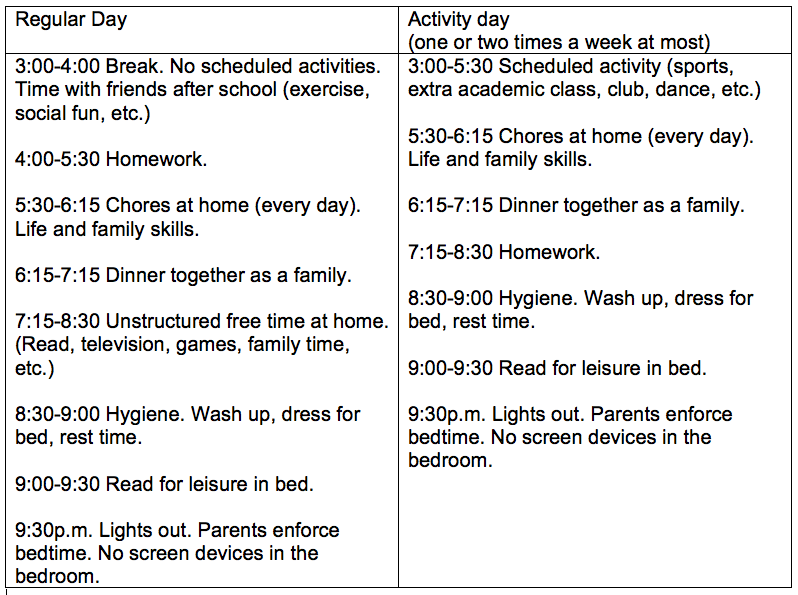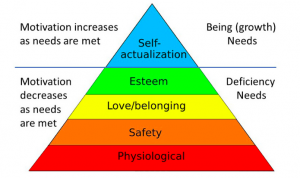Teachers are seeing a decline in common sense, life skills, and general positive attitudes. Creativity is slipping. Social connections are awkward. Kids have inconsistent sleep patterns.  A focus on academics and “the future” seems oppositional to the current development of a teen in middle school. This is a time when social skills, a healthy self-image, exercise patterns, and independent thinking outweigh any prepping for SAT test or academic award.
A focus on academics and “the future” seems oppositional to the current development of a teen in middle school. This is a time when social skills, a healthy self-image, exercise patterns, and independent thinking outweigh any prepping for SAT test or academic award.
A Possible Schedule for a Middle Schooler (for your consideration).
8.75 hours of sleep. This is a doctor-recommended amount.
6:15a.m. — Wake up.
6:15-6:45 — Hygiene (shower, deodorant every day, etc.) [Or shower before bed and use deodorant both night and morning].
6:45-7:15 — Sit-down breakfast, double-check backpack, make lunch.
7:15-7:30 — Travel to school. Don’t arrive at the last minute! It’s stressful.
7:45-3:00p.m. — School. Academics all day, but also moments of friendship and creativity.
After school, please consider only one and no more than two other pursuits in their lives:

Weekends: Rest, social fun, and family time.
 Time with friends and family, creative time (crafts/art), outside activities, movies, television, computer time, chores (life skills), maybe a little time for extended projects at school (no more than one hour), sports, and so on. This time is necessary to create psychologically healthy, kind, and brave people.
Time with friends and family, creative time (crafts/art), outside activities, movies, television, computer time, chores (life skills), maybe a little time for extended projects at school (no more than one hour), sports, and so on. This time is necessary to create psychologically healthy, kind, and brave people.
Today, I had to tell my Language Arts students that they are not allowed to any of my homework after 9:00 p.m. I was blunt. In past years, I used to have gentle conversations talking about the importance of healthy food, exercise, rest, and so on. I told them that their health and happiness is always more important than their academics, and I wanted to show them that I cared enough to enforce it. Unfortunately, these comments seem to be taken with a grain of salt because my students constantly express how they have no time to finish everything before 9:00 p.m., mainly influenced by extra classes and activities beyond the regular school day. I learn about their extra classes and extra activities through many conversations about how they are all exhausted and never sleep.
I wish that I could say that these conversations were rare. I’ve been a teacher for twenty years now, and I am absolutely committed to serving my clients (students and their parents). Yet, as much as I hoped this kind of scheduling for children would be minimized by the numerous articles and studies that come out in the news on a regular basis, it hasn’t. Pediatricians, college professors, teachers, psychologists, school counselors, coaches, and most children would agree that kids need more time to rest, make friends, eat healthy food, have fun, and spend time with family. Eighty percent of my students say that they endure “over-scheduling” at thirteen years old, and because this often forces them to finish homework into the late hours of the night, even beyond midnight, students aren’t always physically or emotionally healthy.

Maslow’s Hierarchy of Needs
Consider Maslow’s hierarchy. This is a psychological concept with five levels that explains that no one can achieve his/her potential (a.k.a. learn anything new) without the lower levels of the pyramid, like safety, food, rest, friendship, love and belonging, and self-esteem (a.k.a happiness). Many of my students were actually laughing, thinking that it was funny that there could ever be a time when they would prioritize friendship over schoolwork. Five students in that class said that they never eat lunch and eight students said they never have time for breakfast before school.
Consider coming together as a family and reviewing everyone’s schedules. Are they healthy? Is there room for improvement?
Thanks for reading.